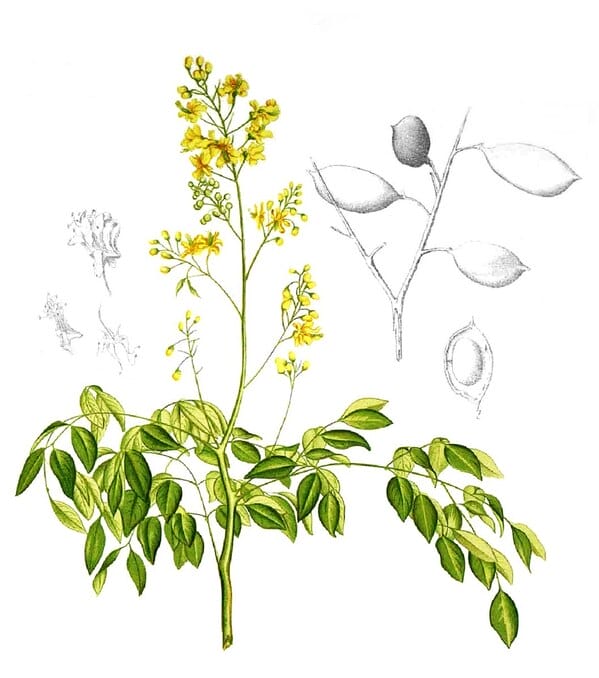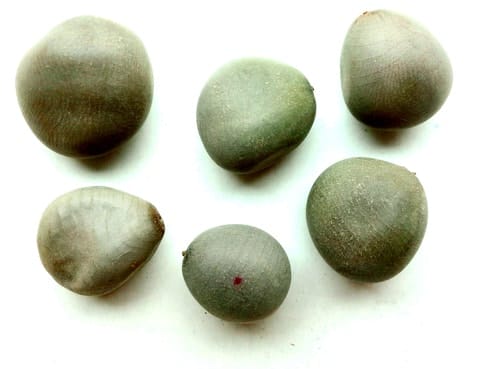Caesalpinia crista
Bonduc nut, Fever nut, Nicker nut, CaesalpiniaJam ‘bras འཇམ་འབྲས (Tibetan)
Lata Karanja (Ayurveda)
Bandogh Hendi, Akatmakat (Unani)
Da Tuo Ye Yun Shi (TCM)
 Caesalpinia crista
Caesalpinia cristaBlanco, M., Flora de Filipinas, (1875)
 Caesalpinia crista seed
Caesalpinia crista seed(Adam, 2017)
Botanical name:
Caesalpinia crista, C. bonducella
Parts used:
Seed kernel
Temperature & Taste:
Warm, dry. Bitter, Pungent, astringent
Uses:
1. Warms the Kidneys, Clears Cold:
-Edema
-obstinate urinary diseases, chronic Kidney diseases
-Diabetes
-Rheumatism, Osteoarthritis
2. Warms the Stomach, Benefits Digestion:
-Colic, abdominal pain
-Vomiting and Diarrhea from Cold
-Phantom Tumor (cold with qi stagnation)
-all diseases associated with low digestive fire (agni)
3. Clears Cold Phlegm, Stops Cough:
-Cough, Dyspnoea
4. Moves the Blood, Clears Cold, Promotes Menstruation
-Amenorrhea,
-promotes Healing of Wounds
-Hemorrhoids
5. Resists Poison, Kills Parasites:
-Intermittent Fever; has been found useful in Malaria
-effective for Amoebic Dysentery
-Ulcers, Internal Abscess
-skin diseases, including obstinate skin diseases including Leprosy and Elephantiasis
-Parasites
Dose:
Powder: 1–3 grams; 5 grams has reportedly been used for Diabetes
Used as a stand-alone herb for Amoebic Dysentery (2 grams, 3 times daily), resolved 100% of symptoms and gave negative stool sample.
Comment:
1. Caesalpinia crista is similar to and sometimes confused with Pongamia pinnata. They have similar uses and are sometimes combined.
2. Caesalpinia crista is also similar to Mango kernel, the 2 often being combined to warm and strengthen the Kidneys, and together with Eugenia jambolana form the Three Seeds of Tibetan Medicine.
Preparation:
1. Dry Fried Seed:
Seeds are typically dry fried, shell is removed, then ground for use.
In Tibet, they are typically heated on coals until yellowed.
2. Oil Fried Seed
In some cases, the seeds are fried in Castor oil, shell is removed, then pounded.
Substitute:
1. Pongamia pinnata
Main Combinations:
Three Seeds (Tibetan Medicine)
Mango kernel, Eugenia jambolana (Sra Bras) and Caesalpinia (Jam Bras) are the Three Seeds of Tibetan Medicine. Together, they warm and strengthen the Kidneys.
1. Cold and Weak Kidneys, Nephritis, Dysuria, Chronic Kidney disease, Caesalpinia with Chebulic Myrobalan, Mallow seed (M. verticillata), Madder, Lacca, Mango kernel, Safflower, Shilajit, Lesser Cardamon (as in Chebula 18 of Tibetan Medicine)
2. Malaria, Caesalpinia crista with Picrorhiza, Swertia, Alstonia scholaris (Ayurveda)
Major Formulas:
Betel nut 28 (Go yu nyer brgyad) (Tibetan)
Cardamon 19 (Sug smel bcu dgu) (Tibetan)
Greater Salt Combination (Tshwa sbyor chen mo) (Tibetan)
Thlaspi 13 (Bre ga bcu gsum) (Tibetan
Cautions:
None noted
